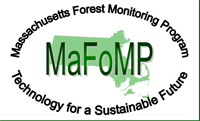
In the Massachusetts Forest Monitoring Program (MAFoMP), Clark students work with faculty to apply remote sensing data and technology to monitor large-area forest cover change in Massachusetts.
Typically mandated to operate over large areas, operational monitoring programs face daunting logistical and methodological constraints, in addition to data acquisition and analysis costs that differ from standard case study approaches to land cover change. The leading constraints include: choice of appropriate classification scheme; issues concerning data consistency and map accuracy (i.e., calibration and validation); very large data volumes; and time consumption related to data processing and interpretation. Large area monitoring programs are not common, but are expected to increase in the near future. While a large body of work has accumulated regarding land cover change monitoring using remote sensing data, very little guidance exists for addressing large area change mapping, especially in an operational context.
This research aims to establish a large area land cover monitoring program in Massachusetts. Although the majority of Massachusetts is covered in forest, little is known about the patterns and processes of timber harvest and forest growth at landscape to regional scales. MAFoMP is a program to monitor forest cover changes in Massachusetts using remote sensing data and state-of-the-art image processing techniques. We acquire, process, and classify Landsat imagery over three-year intervals from 1973 to present. Ancillary data such as slope and precipitation are used as inputs in the machine-learning classification process. Calibration and validation data sets are assembled using field data, state timber harvest records, and US Forest Service FIA plot data. This project will therefore contribute to improving the accuracy and efficiency of large-scale land-use change monitoring initiatives in Massachusetts and elsewhere.
Click here for MaFoMP's current research proposal.
|
Research Products |
|
|
MAFoMP Research Poster 2004-05 |
|
|
A comparison of non-parametric classification techniques (JMiller & JRogan 2005) Mapping Wildfire Disturbances in Southern California Using Machine Learning Algorithms (Rogan 2005) |
|
MAFoMP Fellows are Ryan Frazier, Trevor Jones, Christopher Lippitt, and Daniel Pomerleau. Anna Versluis is a research assistant. Dr. John Rogan is the faculty advisor.
Please contact Professor John Rogan at jrogan@clarku.edu for further information.